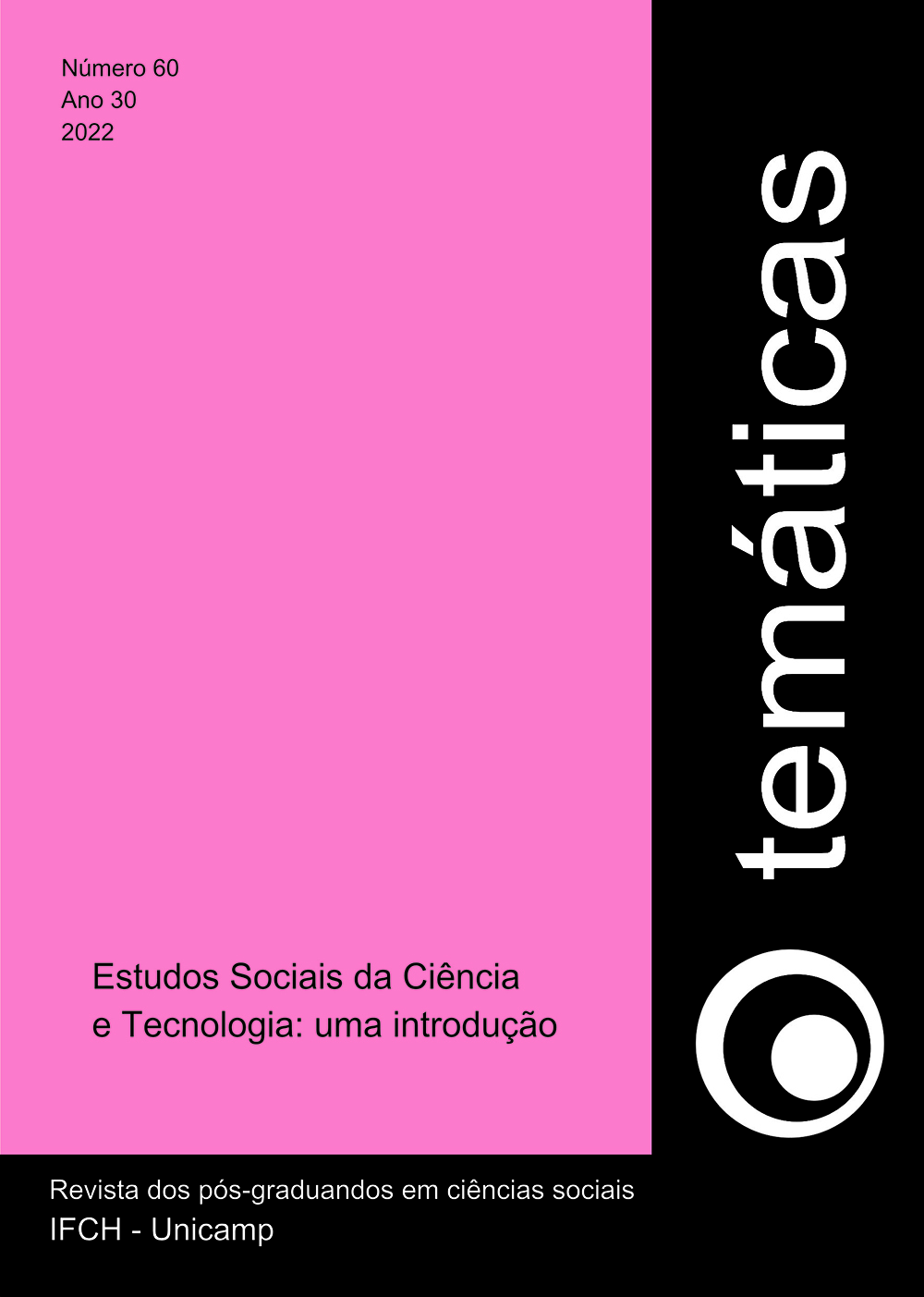Abstract
The paper’s goal is to present the main points of the discussion about expertise and the role of experts in decision-making based upon Dorothy Nelkin’s and Helga Nowotny’s work on the subject. Through literature review, we briefly present the history of the Social Studies of Science and Technology. Next, we explore the topic of expertise and the role of experts as an object of study and delve into the implications of increased involvement of scientists in controversial areas, discussed by Dorothy Nelkin in “The Political Impact of Technical Expertise”, published in 1975, and Helga Nowotny in “Democratizing expertise and socially robust knowledge”, published 2003. We conclude that the expertise-knowledge-decision-making relationship is a topic that is being explored by the Social Studies of Science and Technology field for decades and is still under discussion. The contribution of the studies explored is to recognize that the mobilization of scientific knowledge as expertise in controversial issues is inherently conflicting and permeated by uncertainties, and identifying and reporting on such uncertainties must be part of the solution of such controversies, overcoming the idea that the role of science is to reduce the uncertainties to zero.
References
BUSH, Vannevar. Science. The Endless Frontier. Washington, DC: National Science Foundation, (1960) [1945]. Disponível em: https://www.nsf.gov/od/lpa/nsf50/vbush1945.htm. Acesso em: 11 mai. 2023.
BROWN, Mark B. Science in Democracy: Expertise, Institutions, and Representation. Cambridge, MA: The MIT Press. 2009.
COLLINS, Harry; PINCH, Trevor. O Golem: o que você deveria saber sobre ciência. Belo Horizonte: Fabrefactum. 2010.
EPSTEIN, Steven. Impure Science: AIDS, Activism, and the Politics of Knowledge. Berkeley: University of CalifórniaCalifornia Press. 1998.
GIERYN, Thomas F. Boundary-Work and the Demarcation of Science From Non-Science: Strains and Interests in Professional Ideologies of Scientists. American Sociological Review 48(6): 781–795, 1983. Disponível em: https://doi.org/10.2307/2095325. Acesso em: 11 mai. 2023.
GRUNDMANN, Reiner. The Problem of Expertise in Knowledge Societies. Minerva, número 55, p. 25-48, 2017. Disponível em: https://link.springer.com/article/10.1007/s11024-016-9308-7. Acesso em: 11 mai. 2023.
JASANOFF, Sheila. The Fifth Branch: Science Advisers as Policymakers. Cambridge, MA: Harvard University Press. 1990.
JASANOFF, Sheila. Technologies of humility. Nature, volume 450, p. 33, 2007. Disponível em: https://doi.org/10.1038/450033a. Acesso em: 11 mai. 2023.
VELHO, Léa Maria Leme Strini. Conceitos de Ciência e a Política Científica, Tecnológica e de Inovação. Sociologias. Porto Alegre, ano 13, no 26, jan./abr. 2011, p. 128-153. Disponível em: https://www.scielo.br/j/soc/a/q5SC5wGHhpGpzL86NZyDgDS/?format=pdf. Acesso em: 11 mai. 2023.
NELKIN, Dorothy. The Political Impact of Technical Expertise. Social Studies of Science, volume 5, número 1, p. 35–54, 1975. Disponível em: https://www.jstor.org/stable/284554. Acesso em: 11 mai. 2023.
NOWOTNY, Helga. Dilemma of expertise: democratising expertise and socially robust knowledge. Science and Public Policy, volume 30, número 3, p. 151-156, 2003. Disponível em: https://doi.org/10.3152/147154303781780461. Acesso em: 11 mai. 2023.
PINCH, Trevor; BIJKER, Wiebe. The Social Construction of Facts and Artefacts: Or How the Sociology of Science and the Sociology of Technology Might Benefit Each Other. Social Studies of Science, volume 14, número 3, p. 399-441, 1984. Disponível em: https://doi.org/10.3152/147154303781780461. Acesso em: 11 mai. 2023.
RECUERO, Raquel; SOARES, Felipe Bonow; VINHAS, Otávio; VOLCAN, Taiane; ZAGO, Gabriela; STUMPF, Elisa Marchioro; VIEGAS, Paula; HÜTTNER, Luiz Ricardo; BONOTO, Carolina; SILVA, Gabriela; PASSOS, Iara; SALGUEIRO, Igor; SODRÉ, Giéle. Desinformação, mídia social e COVID-19 no Brasil. Pelotas, RS: Mediars, 2021. Disponível em: https://wp.ufpel.edu.br/midiars/files/2021/05/Desinformac%CC%A7a%CC%83o-covid-midiars-2021-1.pdf. Acesso em: 11 mai. 2023.
SZMRECSÁNYI, Tamás. Esboços de História Econômica da Ciência e da Tecnologia. In: SOARES, Luiz Carlos (org.). Da Revolução Científica à Big (Business) Science. São Paulo: HUCITEC, p. 155-200, 2001.
VICENTE, Alexandre M. Estudos sociais da ciência e tecnologia e engajamento: novas tendências. Mediações Revista de Ciências Sociais, pp. 276-291, Jun. 2014. Disponível em: https://doi.org/10.5433/2176-6665.2014v19n1p249. Acesso em: 11 mai. 2023.
WEINGART, Peter. Scientific Expertise and Political Accountability: Paradoxes of Science in Politics. Science and Public Policy 26(3): 151–161, 1999. Disponível em: https://doi.org/10.3152/147154399781782437. Acesso em: 11 mai. 2023.

This work is licensed under a Creative Commons Attribution-NonCommercial-ShareAlike 4.0 International License.
Copyright (c) 2023 Luciana de Farias, Daniela Albini Pinheiro, Marina Fontolan


